Sempron
Sempron has been the marketing name used by AMD for several different budget desktop CPUs, using several different technologies and CPU socket formats. The Sempron replaced the AMD Duron processor and competed against Intel's Celeron series of processors. AMD coined the name from the Latin semper, which means "always", to suggest the Sempron is suitable for "daily use, practical, and part of everyday life".[2] The last Semprons were launched in April 2014. The brand was retired with the launch of the AMD A-Series APUs.
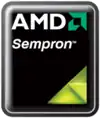 | |
| General information | |
|---|---|
| Launched | July 2004 to April 2014 |
| Common manufacturer(s) |
|
| Performance | |
| Max. CPU clock rate | 1.0 GHz to 2.9 GHz |
| FSB speeds | 166 MHz to 2700 MHz |
| Architecture and classification | |
| Technology node | 130 nm to 28 nm |
| Instruction set | x86, AMD64 |
| Physical specifications | |
| Cores |
|
| Socket(s) | |
| Products, models, variants | |
| Core name(s) |
|
| History | |
| Predecessor(s) | Duron |
History and features
The first Sempron CPUs were based on the Athlon XP architecture using the Thoroughbred or Thorton core. These models were equipped with the Socket A interface, 256 KiB L2 cache and 166 MHz Front side bus (FSB 333). Thoroughbred cores natively had 256 KiB L2 cache, but Thortons had 512 KiB L2 cache, half of which was disabled and could sometimes be reactivated with a slight physical modification to the chip. Later, AMD introduced the Sempron 3000+ CPU, based on the Barton core with 512 KiB L2 cache. From a hardware and user standpoint, the Socket A Sempron CPUs were essentially identical to Athlon XP desktop CPUs with a new brand name. AMD has ceased production of all Socket A Sempron CPUs.
The second generation (Paris/Palermo core) was based on the architecture of the Socket 754 Athlon 64. Some differences from Athlon 64 processors include a reduced cache size (either 128 or 256 KiB L2), and the absence of AMD64 support in earlier models. Apart from these differences, the Socket 754 Sempron CPUs share most features with the more powerful Athlon 64, including an integrated (on-die) memory controller, the HyperTransport link, and AMD's "NX bit" feature.
In the second half of 2005, AMD added 64-bit support (AMD64) to the Sempron line. Some journalists (but not AMD) often refer to this revision of chips as "Sempron 64" to distinguish it from the previous revision. AMD's intent in releasing 64-bit entry-level processors was to extend the market for 64-bit processors, which at the time of Sempron 64's first release, was a niche market.
In 2006, AMD announced the Socket AM2 and Socket S1 line of Sempron processors. These are functionally equivalent to the previous generation, except they have a dual-channel DDR2 SDRAM memory controller which replaces the single-channel DDR SDRAM version. The TDP of the standard version remains at 62 W (watts), while the new "Energy Efficient Small Form Factor" version has a reduced 35 W TDP. The Socket AM2 version also does not require a minimum voltage of 1.1 volts to operate, whereas all socket 754 Semprons with Cool'n'Quiet did. In 2006, AMD was selling both Socket 754 and Socket AM2 Sempron CPUs concurrently. In the middle of 2007 AMD appears to have dropped the 754 line and is shipping AM2 and S1 Semprons.
| AMD Sempron processor family | |||||||
|---|---|---|---|---|---|---|---|
| Logo | Desktop | Logo | Laptop | ||||
| Code-named | Core | Date released | Code-named | Core | Date released | ||
 |
Thoroughbred Thorton Barton Paris Palermo Manila |
130 nm 130 nm 130 nm 130 nm 90 nm 90 nm |
Jul 2004 Aug 2004 Sep 2004 Jul 2004 Aug 2004 May 2006 |
 |
Dublin Georgetown Sonora Albany Roma Keene |
130 nm 130 nm 90 nm 90 nm 90 nm 90 nm |
Jul 2004 May 2005 Nov 2004 Jul 2005 Jul 2005 May 2006 |
 |
Sparta Brisbane Sargas |
65 nm 65 nm 45 nm |
Aug 2007 Mar 2008 July 2009 |
 |
Sherman Sable Huron |
65 nm 65 nm 65 nm |
May 2007 Jun 2008 Jan 2009 |
| List of AMD Sempron microprocessors | |||||||
Models for Socket A (Socket 462)
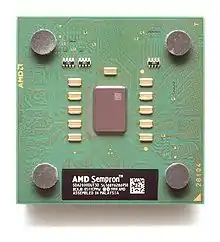
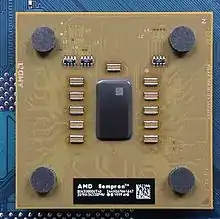
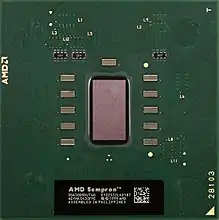
Thoroughbred B/Thorton (130 nm)
- L1-Cache: 64 + 64 KiB (Data + Instructions)
- L2-Cache: 256 KiB, full speed
- MMX, 3DNow!, SSE
- Socket A (EV6)
- Front side bus: 166 MHz (FSB 333)
- VCore: 1.6 V
- First release: July 28, 2004
- Clockrate: 1500 MHz – 2000 MHz (2200+ to 2800+)
Barton (130 nm)
- L1-Cache: 64 + 64 KiB (Data + Instructions)
- L2-Cache: 512 KiB, full speed
- MMX, 3DNow!, SSE
- Socket A (EV6)
- Front side bus: 166 MHz – 200 MHz (FSB 333 – 400)
- VCore: 1.6 – 1.65 V
- First release: September 17, 2004
- Clockrate: 2000–2200 MHz (Sempron 3000+, Sempron 3300+)
Models for Socket 754
Paris (130 nm SOI)
- L1-Cache: 64 + 64 KiB (Data + Instructions)
- L2-Cache: 256 KiB, full speed
- MMX, 3DNow!, SSE, SSE2
- Enhanced Virus Protection (NX bit)
- Integrated 72-bit (Single channel, ECC capable) DDR memory controller
- Socket 754, 800 MHz HyperTransport
- VCore: 1.4 V
- First release: July 28, 2004
- Clockrate: 1800 MHz (3100+)
- Stepping: CG (Part No.: *AX)
Palermo (90 nm SOI)
- Early models (stepping D0) are downlabeled "Oakville" mobile Athlon64
- L1-Cache: 64 + 64 KiB (Data + Instructions)
- L2-Cache: 128/256 KiB, full speed
- MMX, 3DNow!, SSE, SSE2
- SSE3 support on E3 and E6 steppings
- AMD64 on E6 stepping
- Cool'n'Quiet (Sempron 3000+ and higher)
- Enhanced Virus Protection (NX bit)
- Integrated 72-bit (Single channel, ECC capable) DDR memory controller
- Socket 754, 800 MHz HyperTransport
- VCore: 1.4 V
- First release: February 2005
- Clockrate: 1400–2000 MHz
- 128 KiB L2-Cache (Sempron 2600+, 3000+, 3300+)
- 256 KiB L2-Cache (Sempron 2500+, 2800+, 3100+, 3400+)
- Steppings: D0 (Part No.: *BA), E3 (Part No.: *BO), E6 (Part No.: *BX)
Models for Socket 939
Palermo (90 nm SOI)
- L1-Cache: 64 + 64 KiB (Data + Instructions)
- L2-Cache: 128/256 KiB, full speed
- MMX, 3DNow!, SSE, SSE2, SSE3, AMD64 (E6 Steppings Only), Cool'n'Quiet, NX bit
- Integrated 144-bit (Dual channel, ECC capable) DDR memory controller
- Socket 939, 800 MHz HyperTransport
- VCore: 1.35/1.4 V
- First release: October 2005
- Clockrate: 1800–2000 MHz
- 128 KiB L2-Cache (Sempron 3000+, 3400+)
- 256 KiB L2-Cache (Sempron 3200+, 3500+)
- Steppings: E3 (Part No.: *BP), E6 (Part No.: *BW)
Models for Socket AM2
Manila (90 nm SOI)
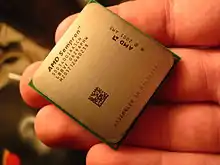
- L1-Cache: 64 + 64 KiB (Data + Instructions)
- L2-Cache: 128/256 KiB, full speed
- MMX, Extended 3DNow!, SSE, SSE2, SSE3, AMD64, Cool'n'Quiet, NX bit
- Integrated 128-bit (Dual channel) DDR2 memory controller
- Socket AM2, 800 MHz HyperTransport
- VCore: 1.25/1.35/1.40 V (1.20/1.25 V for Energy Efficient SFF version)
- First release: May 23, 2006
- Clockrate: 1600–2200 MHz
- 128 KiB L2-Cache (Sempron 2800+, 3200+, 3500+)
- 256 KiB L2-Cache (Sempron 3000+, 3400+, 3600+, 3800+)
- Stepping: F2 (Part No.: *CN, *CW)
Sparta (65 nm SOI)
- L1-Cache: 64 + 64 KiB (Data + Instructions)
- L2-Cache: 256/512 KiB, full speed
- MMX, Extended 3DNow!, SSE, SSE2, SSE3, AMD64, Cool'n'Quiet, NX bit
- Integrated 128-bit (Dual channel) DDR2 memory controller
- Socket AM2, 800 MHz HyperTransport
- VCore: 1.20/1.40 V
- First release: August 20, 2007
- Clockrate: 1900–2300 MHz
- 256 KiB L2-Cache (Sempron LE-1100, LE-1150)
- 512 KiB L2-Cache (Sempron LE-1200, LE-1250, LE-1300)
- Stepping: G1 (Part No.: *DE), G2 (Part No.: *DP)
Models for Socket AM3
Sargas (45 nm SOI)
- Chip harvests from Regor with one core disabled[4]
- Core Speed (MHz) – 2600–2900
- Max Temps (C): 63
- VCore: 1.35 V
- TDP: 45 W
- L1 Cache Size (KB) 128
- L2 Cache Size (KB) 1024
- CPU Arch : 1 CPU – 1 Cores – 1 Threads
- CPU EXT : MMX(+) 3DNow!(+) SSE SSE2 SSE3 SSE4A x86-64 AMD-V, Cool'n'Quiet, NX bit
- Integrated 128-bit (Dual Channel) DDR2 + DDR3 Memory Controller
- Socket AM3, 2000 MHz HyperTransport
- Steppings: C2, C3
Models for Socket S1 (638)
Keene (90 nm SOI)
- L1-Cache: 64 + 64 KiB (Data + Instructions)
- L2-Cache: 256 or 512 KiB, full speed
- MMX, Extended 3DNow!, SSE, SSE2, SSE3, AMD64, Cool'n'Quiet, NX bit
- Integrated 128-bit (Dual channel) DDR2 memory controller
- Socket S1, 800 MHz HyperTransport
- VCore: 0.950-1.25 V
- First release: May 17, 2006
- Clockrate: 1000–2000 MHz
- 256 KiB L2-Cache (Sempron 2100+, 3400+)
- 512 KiB L2-Cache (Sempron 3200+, 3500+, 3600+)
- Stepping: F2 (Part No.: *CM)
Sable (65 nm SOI)
- L1-Cache: 64 + 64 KiB (Data + Instructions)
- L2-Cache: 512 KiB, full speed
- MMX, Extended 3DNow!, SSE, SSE2, SSE3, AMD64, Cool'n'Quiet, NX bit
- Integrated 128-bit (Dual channel) DDR2 memory controller
- Socket S1, 1600 MHz HyperTransport
- VCore: 0.950-1.25 V
- First release: January 8, 2009
- Clockrate: 2000–2100 MHz 25w
- 512 KiB L2-Cache
Models for ASB1 package (BGA)
Huron (65 nm SOI)
- L1-Cache: 64 + 64 KiB (Data + Instructions)
- L2-Cache: 256 KiB, full speed
- MMX, Extended 3DNow!, SSE, SSE2, SSE3, AMD64, Cool'n'Quiet, NX bit
- Integrated 128-bit (Dual channel) DDR2 memory controller
- ASB1 package, 800 MHz HyperTransport
- VCore: ?
- First release: January 8, 2009
- Clockrate: 1000–1500 MHz
- 256 KiB L2-Cache (Sempron 200U) 1000 MHz TDP 8 W
- 256 KiB L2-Cache (Sempron 210U) 1500 MHz TDP 15 W
- Stepping: ? (Part No.: *DV)
Models for Socket 754 32-bit Semprons
| Max P-State | Model | Manufacturing Process | Part Number(OPN) |
|---|---|---|---|
| 1600 MHz | 2600+ | 0.09 micrometre | SDA2600AIO2BA(some parts are 64-bit) |
| 1600 MHz | 2800+ | 0.09 micrometre | SDA2800AIO3BA |
| 1800 MHz | 3000+ | 0.13 micrometre | SDA3000AIP2AX |
| 1800 MHz | 3100+ | 0.13 micrometre | SDA3100AIP3AX |
| 1800 MHz | 3100+ | 0.09 micrometre | SDA3100AIO3BA |
| 2000 MHz | 3300+ | 0.09 micrometre | SDA3300AIO2BA |
| 2000 MHz | 3400+ | 0.09 Micrometre | SDA3400AIO3BX |
Models for Socket S1 (638) 64-bit Semprons
| Max P-State | Model | Manufacturing Process | Part Number(OPN) |
|---|---|---|---|
| 1000 MHz | 800 | 0.09 micrometre | TBA |
| 1600 MHz | 3200 | 0.09 micrometre | SMS3200HAX4CM |
| 1800 MHz | 3400 | 0.09 micrometre | SMS3400HAX3CM |
| 1800 MHz | 3500 | 0.09 micrometre | SMS3500HAX4CM |
| 2000 MHz | 3600 | 0.09 micrometre | SMS3600HAX3CM |
FM2/FM2+ Semprons
- Model 240, 3.3 GHz/2.9 GHz, 1MB cache, 65W[5]
- Model 250, 3.6 GHz/3.2 GHz, 1MB cache, 65W, Piledriver microarchitecture, Richland core
Models for Socket AM1
| Model Number | Cores | Frequency | L2-Cache | HyperTransport | Mult 2 | Voltage | TDP | Release Date | Part Number(s) |
|---|---|---|---|---|---|---|---|---|---|
| Sempron 2650 | 2 | 1.45 GHz | 1 MB | — | 14.5x | Unknown | 25 W | April 9, 2014 | SD2650JAH23HM |
| Sempron 3850 | 4 | 1.30 GHz | 2 MB | — | 13x | Unknown | 25 W | April 9, 2014 | SD3850JAH44HM |
Semprons without Cool'n'Quiet
AMD has released some Sempron processors without Cool'n'Quiet support. The following table describes those processors lacking Cool'n'Quiet.
| Max P-State | Min P-State | Model | Operating Mode | Package-Socket | Manufacturing Process | Part Number(OPN) |
|---|---|---|---|---|---|---|
| 1400 MHz | N/A | 2500+ | 32/64 | Socket 754 | 0.09 micrometre | SDA2500AIO3BX |
| 1600 MHz | N/A | 2600+ | 32 or 32/64 | Socket 754 | 0.09 micrometre | SDA2600AIO2BA |
| 1600 MHz | N/A | 2600+ | 32/64 | Socket 754 | 0.09 micrometre | SDA2600AIO2BX |
| 1600 MHz | N/A | 2800+ | 32 | Socket 754 | 0.09 micrometre | SDA2800AIO3BA |
| 1600 MHz | N/A | 2800+ | 32/64 | Socket 754 | 0.09 micrometre | SDA2800AIO3BX |
| 1600 MHz | N/A | 2800+ | 32/64 | Socket AM2 | 0.09 micrometre | SDA2800IAA2CN |
| 1600 MHz | N/A | 3000+ | 32/64 | Socket AM2 | 0.09 micrometre | SDA3000IAA3CN |
| 1600 MHz | N/A | 3000+ | 32/64 | Socket AM2 | 0.09 micrometre | SDA3000IAA4CN |
See also
References
- "AMD Sempron APUs". AMD. Retrieved 2014-12-08.
- "AMD Sempron FAQs". Archived from the original on August 24, 2006.
- "Attention! Remarked Sempron 2800+ [March 02, 2006] - Fab51".
- "List of Unlockable AMD CPUs".
- "AMD: Sempron CPUs, FM2/FM2+ Model Number Comparison". Retrieved 8 September 2015.